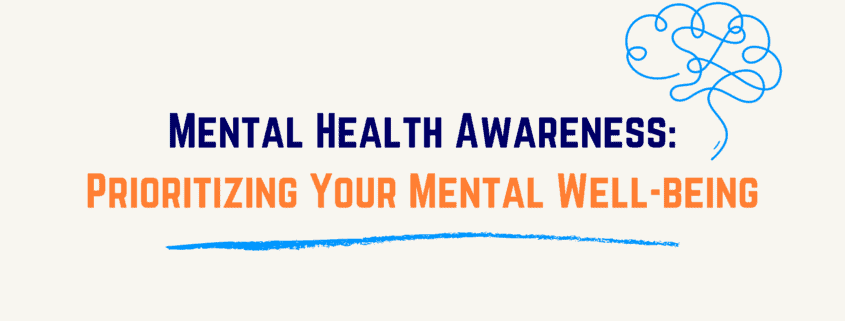
Mental Health Awareness: Prioritizing Your Mental Well-being
May is widely recognized as Mental Health Awareness Month, a time dedicated to raising awareness about mental health issues and promoting the importance of mental well-being. This annual observance, which has been in place since 1949, serves as a reminder that mental health is just as critical as physical health. As we navigate through the complexities of modern life, it becomes increasingly important to prioritize our mental health and implement strategies to monitor and improve it.
The Importance of Mental Health
Mental health encompasses our emotional, psychological, and social well-being. It affects how we think, feel, and act, influencing every aspect of our lives, from our relationships and work performance to our physical health and ability to handle stress. Good mental health is more than just the absence of mental disorders; it involves a state of well-being in which individuals are able to realize their potential, cope with normal stresses, work productively, and contribute to their community.
Ignoring mental health can lead to severe consequences, including chronic stress, anxiety, depression, and other mental illnesses. These conditions can impair daily functioning and reduce quality of life. Moreover, poor mental health can exacerbate physical health problems, such as heart disease, diabetes, and chronic pain. Therefore, acknowledging and addressing mental health is essential for overall well-being and a fulfilling life.
Recognizing Signs of Mental Health Issues
Understanding the signs of mental health issues is the first step towards managing them effectively. Common indicators include:
Persistent Sadness or Depression: Feeling sad or down for an extended period.
Anxiety: Excessive worrying or fear that interferes with daily activities.
Mood Swings: Extreme changes in mood, from highs (mania) to lows (depression).
Social Withdrawal: Avoiding friends, family, and social activities.
Changes in Eating or Sleeping Patterns: Significant changes in appetite or sleep.
Fatigue: Feeling constantly tired and lacking energy.
Difficulty Concentrating: Trouble focusing, making decisions, or remembering things.
Substance Abuse: Using alcohol, drugs, or other substances to cope with stress or emotions.
If you notice any of these signs in yourself or others, it may be time to ask for help from a friend, family member, or mental health professional.
Steps to Monitor and Improve Mental Health
Practice Self-Care
Regular Exercise: Physical activity releases endorphins, which improve mood and reduce stress. Aim for at least 30 minutes of exercise most days of the week.
Balanced Diet: Eating a nutritious diet supports brain function and overall health. Incorporate fruits, vegetables, whole grains, and lean proteins into your meals.
Adequate Sleep: Ensure you get 7-9 hours of sleep per night to help your body and mind recover and recharge.
Mindfulness and Meditation: Practicing mindfulness or meditation can reduce stress and improve mental clarity. Even a few minutes a day can make a difference.
Build Strong Relationships
Connect with Others: Spending time with family and friends provides emotional support and strengthens your sense of belonging.
Communication: Openly discussing your feelings and concerns with trusted individuals can relieve stress and provide perspective.
Set Realistic Goals
Break Tasks into Smaller Steps: Large tasks can be overwhelming. Breaking them into manageable steps can make them seem more achievable.
Celebrate Achievements: Recognize and celebrate your accomplishments, no matter how small.
Manage Stress
Identify Stressors: Understanding what causes your stress can help you develop strategies to manage it.
Relaxation Techniques: Techniques such as deep breathing, progressive muscle relaxation, and yoga can help reduce stress.
Seek Professional Help
Therapy: Speaking with a psychologist, therapist, or counselor can provide support and coping strategies.
Medication: In some cases, medication prescribed by a psychiatrist may be necessary to manage symptoms.
Stay Informed and Educated
Learn About Mental Health: Educating yourself about mental health can reduce stigma and help you understand your own and others’ experiences better.
Stay Updated: Keep up with the latest research and resources related to mental health.
Engage in Activities You Enjoy
Hobbies and Interests: Engaging in activities you enjoy can provide a sense of accomplishment and joy, contributing positively to your mental health.
Limit Unhealthy Habits
Reduce Alcohol and Drug Use: Limiting or avoiding alcohol and drugs can prevent them from negatively affecting your mental health.
Manage Screen Time: Excessive use of digital devices can lead to stress and anxiety. Setting limits on screen time can help maintain balance.
Practice Gratitude
Gratitude Journaling: Writing down things you are thankful for can shift your focus to positive aspects of your life, enhancing your overall outlook.
Get Involved in the Community
Volunteer: Helping others can provide a sense of purpose and improve your mood.
Join Support Groups: Connecting with others who have similar experiences can provide support and reduce feelings of isolation.
Taking Care of Your Mental Health
Mental Health Month serves as a crucial reminder of the importance of mental well-being. By recognizing the signs of mental health issues and taking proactive steps to maintain and improve mental health, we can lead healthier, more fulfilling lives. Whether it’s through practicing self-care, seeking professional help, or engaging in community activities, there are numerous ways to support our mental health. Remember, taking care of your mental health is not a one-time effort but a continuous process. Prioritize it, and don’t hesitate to seek help when needed. Your mental well-being is more than worth the effort!
Oasis TMS
If you are struggling with depression, you are not alone. Transcranial Magnetic Stimulation (TMS) Therapy is a depression treatment that has been proven effective even when other treatment methods have not worked in the past. At Oasis TMS, we want to help you break free from depression. Give us a call at (888) 417-5973 or visit our website today to learn more about if TMS therapy is right for you!
Leave a Reply
Want to join the discussion?Feel free to contribute!